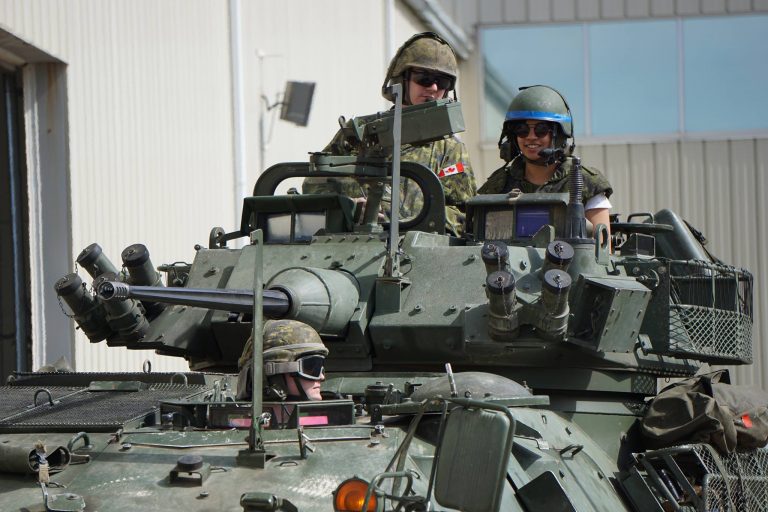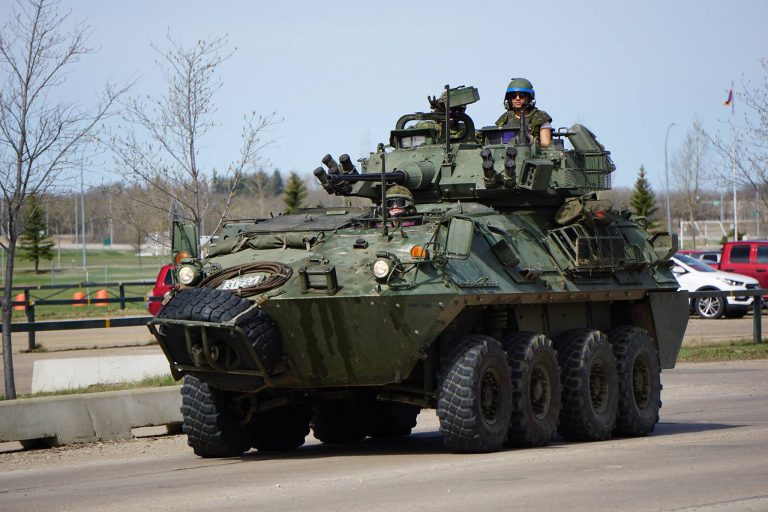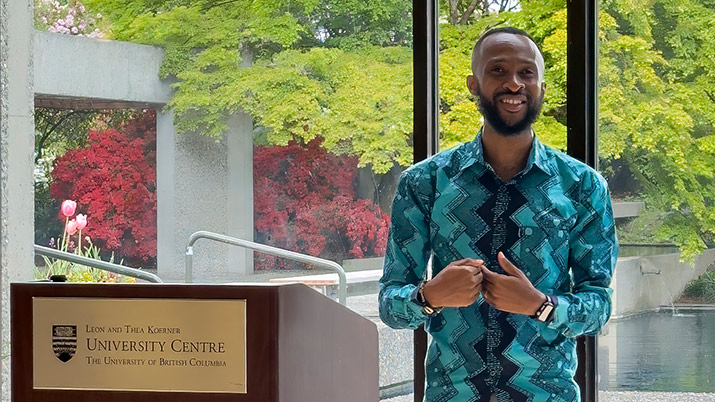

UBC Journalism student Sharon Nadeem kicked off a busy summer of traveling and internships with the nine-day Military Journalism Course at the University of Calgary.
Ten scholarships are granted to journalism students across Canada to enhance the military education of future journalists. The course combines in-class discussions on media on the military with field visits to units. It aims to help students better communicate defense and foreign affairs issues to the public.
Nadeem spoke to us about her experience — including what it was like to simulate combat in a tank.
What interests you about the military?
I’m interested in international reporting and conflict reporting, so I was keen on getting field experience with members of the military.
The course sets you apart in a newsroom. For example, the Canadian forces are in Latvia right now. If there are situations like that where you could report on the military, you could raise your hand and say, hey, I’ve been trained and have all the info I need. I know who to talk to and what exactly these units are doing. Taking this course also shows them that you’ve made an effort to learn about them. It makes it easier to cut down that barrier of being a journalist.
How did you learn about the program?
Two of the second-year students had done the military course and told our class about it. I decided then that I wanted to do it because it was for two weeks and seemed like a unique opportunity.
What was required in the application?
We had to write a 500-word essay on what we thought about the military and why we wanted to do this course. They also asked us to fill out an application and to submit two recommendation letters.
Before writing the essay, I called one of the second-year students who had done the course and asked him what they would be looking for. Also, the northernmost area of India is a highly militarized zone that borders Pakistan and China. I had been there the previous summer, so I drew on my interactions with the military there as the basis for my essay.
How did the course unfold?
The entire course is led by Professor Bob Bergen, who covered the Canadian Forces for more than 25 years.
The first four days of the course were in the classroom. We listened to presentations about different regiments in the military. We had really interesting guest speakers: people from the military, public affairs officers, veterans, even a military journalist. The speakers were the best part of the course.
We then spent three days in the Canadian Forces base in Edmonton. We were taken around the different units: service, medical, infantry and armoured units. We spent half a day with each of them learning what they do to service the battalion. In the evenings, we would hang out with the soldiers, which was a great experience.
You’re there to learn about other people. I knew that not everyone might necessarily be on the same page as me, and I learned to accept and respect that.
What did you learn from speaking to the soldiers?
There’s always been a barrier between journalists and soldiers. We have certain preconceived notions and they have the same about us. It was nice to sit down and just talk to them. We learned about the issues they face in terms of family life. It’s not easy to be on a base for that long and not see your family. Most of these guys are from all over the country and are based in Edmonton now. Some of them don’t get to see their families more than twice a year.
They had as many questions for us as we had for them. They would ask us about our work. They have their own opinions about the media and how they get portrayed. It was nice to clear some of that up.
What was the most memorable part of the experience?
I got to sit in an armoured tank, which was pretty cool. We also got to be in a tank simulator, which is what the armoured unit uses to train. There’s four people in a tank – I was the gunner, another student was the loader, and the other two positions – the crew commander and the guy in back – were two actual soldiers.
They simulated the kinds of things that they shout at each other. They can’t talk inside a tank because it’s too loud. So they were screaming at us the whole time with instructions. Their acronyms didn’t mean anything to me, but it means a lot to them for things like shooting techniques or the ammo they want.


We spent 10 minutes in that exercise. I got to shoot at a couple of the stationary objects on the screen. The soldiers run like a machine and they’re so in sync with each other.
Another one of the great things about this course is that it allows you to meet other journalists from Canada. It’s such a great networking opportunity — to meet people with similar interests to yours. It’s an eclectic mix of people and you make some lifelong friendships.
What was the toughest part of the course?
Learning when to keep some of your opinions to yourself. You’re there to learn about other people. I knew that not everyone might necessarily be on the same page as me, and I learned to accept and respect that.
It was also really tough trying out the army ration, which is basically what they get when they’re out on the field. That food is just terrible. This one guy said the breakfast option that you get makes or breaks your spirit. I asked the men what keeps them going, and one of them said, “Cigarettes, coffee and hate.”
What’s your advice to future students applying for internships?
Figure out what your interests are. Look at the different options and talk to second-year students about their internships. We all did a healthy mix.
Instead of just deciding between print and broadcast and radio, I think it’s more useful to decide whether you like doing daily news or features or investigative features. The medium isn’t as important as the kind of journalism you want to do.
All UBC Journalism students must complete a 12-week professional internship as part of their degree. The internship offers students an opportunity to apply their classroom lessons and gain experience of working in a professional setting.
The internship placement is usually undertaken in the spring and summer after the first two terms of the program are completed. Students work in any medium, in Canada or internationally.
Besides completing the Military Journalism course, Sharon Nadeem interned at the Edmonton Journal and the Yukon News in Whitehorse, YT. She will soon be interning for The Jakarta Post in Indonesia.


